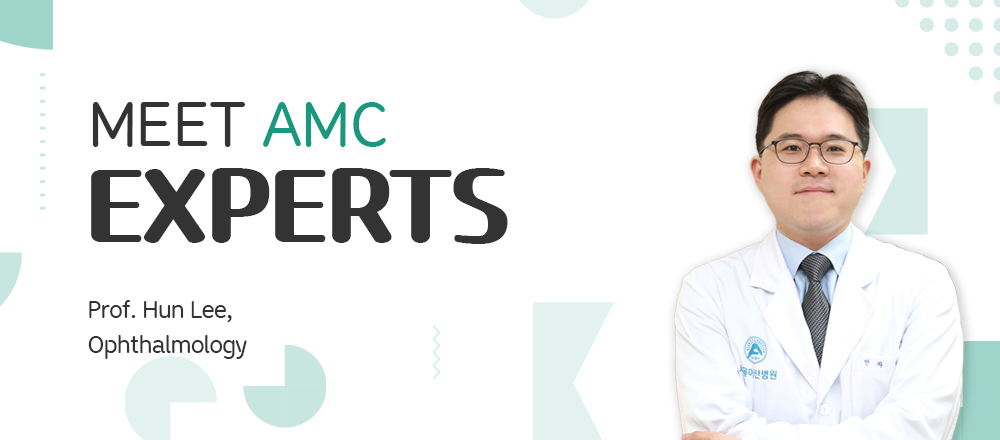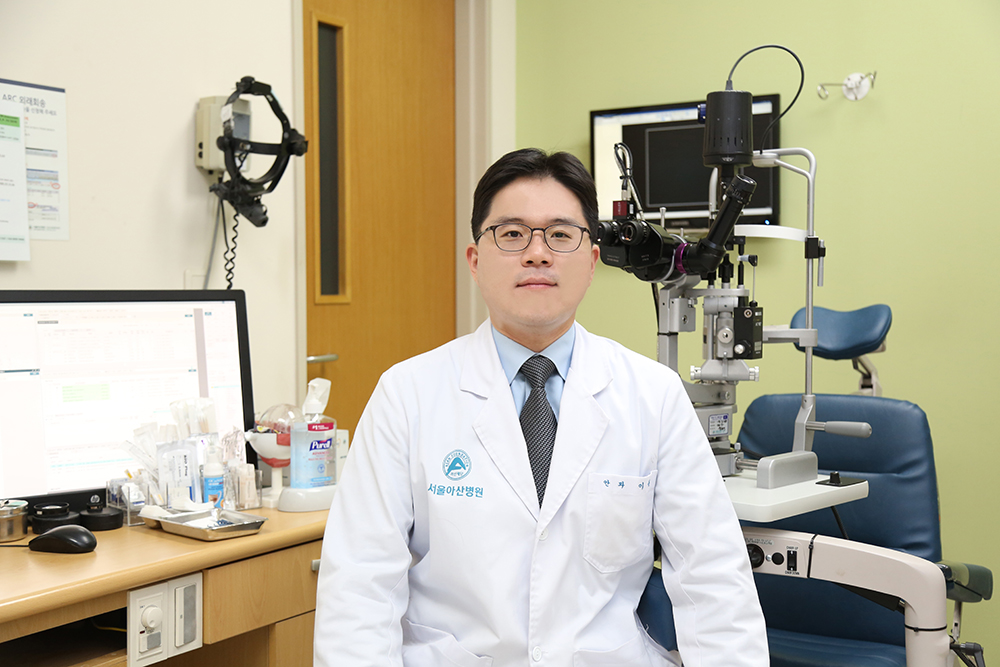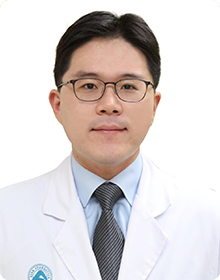-
- Global AMC MENU
- NEWS
- HEALTH
- PEOPLE
- Introduction
Professor Hun Lee, Department of Ophthalmology
“Devoted to clinical practice and research to help patients suffering from eye diseases”

The Department of Ophthalmology of Asan Medical Center (AMC) was visited by more than 4,600 international patients from 77 countries over the past decade. Professor Hun Lee of the Department of Ophthalmology has been researching various treatment methodologies for patients who suffer from eye diseases such as cataracts and cornea, contributing to the development of clinical medicine at home and abroad. Professor Hun Lee shares his story about international patient treatment.
Treatment philosophy behind treating patients from abroad
I believe that the best way to treat patients who entrust their eyes to medical experts is to offer clear demonstrations and explanations, rather than just talking. For example, instead of simply instructing patients to 'wipe their eyelids as described in the instructions,' I demonstrate the process myself to ensure they understand how to properly care for themselves after treatment. By combining my demonstration with friendly conversation, I find that patients feel more at ease and comfortable during the process. These efforts and care not only comfort the patient, but also contribute to safe and effective treatment.
Specialized area of treatment and accumulated experience
While eye diseases may not be life-threatening, they can significantly impact a patient's daily life and cause anxiety. As an ophthalmologist, I find it incredibly rewarding to help patients reconnect with the world visually through cataract and corneal transplantation. For this reason, I chose the anterior segment as my subspecialty, specializing in cataract and corneal surgery. In 2022 alone, I performed approximately 850 cataract surgeries and 130 corneal and amniotic membrane transplantations. I became interested in treating meibomian gland dysfunction(MGD) after observing patients suffering from ocular surface diseases caused by poorly functioning meibomian glands(oil glands on the eyelids) after cataract surgery. Starting with the world’s first report on the efficacy of minocycline antibiotics in treating meibomian gland dysfunction published in the Journal of American Academy of Ophthalmology in 2012, I published papers on the therapeutic effects of loteprednol etabonate eye drops, meibomian gland expression, and ophthalmic IPL. In addition, I introduced IPL treatments using various filters for the first time in the world. My research has led me to report on the effectiveness of using vascular filters in IPL treatment at both the Korean Ophthalmological Society's 2021 Fall Academy and the American Society of Cataract and Refractive Surgery Meeting in 2022. Currently, I run the IPL Dry Eye Clinic, where I use various filters to tailor treatment to each patient's specific eyelid and meibomian gland conditions. In 2022, I performed approximately 1,400 IPL procedures to treat meibomian dysfunction.

Considerations when treating international patients
The greatest challenge in treating international patients is often communication. I have encountered foreign patients who struggled to express their medical conditions due to language barriers. Fortunately, the International Healthcare Center at Asan Medical Center offers interpretation services to help facilitate effective communication with patients and ensure they receive appropriate treatment. Additionally, I make an effort to respect patients' cultural backgrounds and beliefs, as I recognize that cultural differences can also impact patient treatment.
Memorable patient from abroad
I once treated a 40-year-old U.S. soldier with cataracts, which proved to be a challenging case. The patient had already undergone refractory surgery, and as someone who had served in Afghanistan and been exposed to bombs, he was at risk for traumatic cataracts. Moreover, as a soldier, he needed to be able to handle firearms and use computers after the surgery, which required careful consideration of the interocular lens to be implanted. In cataract surgery, an interocular lens is implanted, but it lacks the adjustability of the human lens. Adjustability is the ability to change the thickness of a lens to adjust the focus according to distance so that one can see things clearly. This means that a consultation with the patient is necessary to select the appropriate target for distance - long, mid, or near - so that the patient can see clearly. I had a preoperative consultation with the patient, selected the appropriate interocular lens, and performed the surgery. After the surgery, the patient was able to continue his service in the army without any problems and even got married. In appreciation of the successful surgery, the patient presented me with a medal bearing his troop's emblem.
Message to patients from abroad
I feel greatly rewarded when international patients return to their home country after a satisfying treatment outcome. I will continue to get more actively engaged in treatment and surgery to provide the best treatment for more international patients. My devotion to clinical trial and research is driven by my desire to help patients suffering from cataracts and ocular surface diseases such as keratitis and meibomian dysfunction. I hope you will visit AMC in trust and recover your daily life.
※ 'Meet AMC Experts' features dedicated doctors at Asan Medical Center(AMC) who shed light on international patients coming a long way from home for treatment.

Ophthalmology
Professor Hun Lee
Specialty : Cataract, Laser Cataract Clinic, IPL Dry Eye Clinic, Cornea, Corneal Transplantation, Presbyopia
Position : Professor for Special Exam Service Team
Academic Activities : Director of Vice General Affairs, Korean Society of Cataract and Refractive Surgery / Director of Editing, The Korean Contact Lens Study Society












